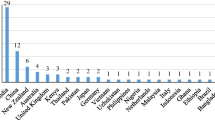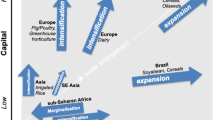Abstract
Recent decades have seen a rapid increase in the rate of conversion from conventional to organic farming, as organic farming shifted from an alternative production approach practiced by a small number of idealists, to the de facto alternative to mainstream conventional production. Although there has been considerable academic debate as to the role of agri-business penetration into the production and marketing chains of organic farming (‘conventionalization’), less is known about how the economic drivers of conventionalization are negotiated into practices at the farm level. Drawing on Bourdieu’s conceptualization of economic and cultural capitals, the direct connection between symbols of ‘good farming’ and the economic requirements of maintaining a viable farming business (i.e., the ‘taste of necessity’) is demonstrated. Findings indicate that conventional and organic farmers in the study sites identified a similar range of cultural symbols, but organic farmers emphasized different symbols within this range. This diversity and selectivity demonstrates the fragmentation and contestation of ideals resulting from economic challenges at the time of the study. Economic capital is important to the decision to consider conversion to organic farming, but formal conversion reflects re-weighting of forms of cultural capital. The author argues that recognition of the impact of economic pressures on conventional farming, which in the study sites often led to reduced input use rather than intensification, is missing from the conventionalization debate. The mainstreaming of organic farming production has presented conventional farmers with a set of alternative or re-weighted symbols and a crucible for reflexive consideration of their own standards and practices of farming.
Similar content being viewed by others
Notes
Silvasti (2003) discussed organic farming with her respondents, but did not interview organic farmers.
It is important to note that farmers’ assessment that conversion to organic farming would not increase farm profitability may be accurate in these cases. A recent Soil Association Study (2010) in the UK found that on average, organic farming was only marginally more profitable in many commodities with no advantage in some.
Conversion to organic farming was not the only option available to farmers. Options also included diversification, and pluriactivity. Transitioning towards non-commercial farming, maintaining farming activities as a ‘luxury’ on which their household income was not dependent was the choice made by Luke.
References
Bell, M.M., S. Jarnagin, G. Peter, and D. Bauer. 2004. Farming for us all: Practical agriculture and the cultivation of sustainability. State College, PA: Penn State University Press.
Best, H. 2008. Organic agriculture and the conventionalization hypothesis: A case study from West Germany. Agriculture and Human Values 25: 95–106.
Beus, C.E., and R.E. Dunlap. 1994. Endorsement of agrarian ideology and adherence to agricultural paradigms. Rural Sociology 59: 462–484.
Bourdieu, P. 1984. Distinction: A social critique of the judgement of taste (trans: Nice, R.). London: Routledge.
Bourdieu, P. 1986. The forms of capital. In Handbook of theory and research for the sociology of education, ed. J. Richardson, 241–258. New York: Greenwood Press.
Buck, D., C. Getz, and J. Guthman. 1997. From farm to table: The organic vegetable commodity chain of northern California. Sociologia Ruralis 37: 3–20.
Burton, R.J.F. 2004. Seeing through the ‘good farmer’s’ eyes: Towards developing an understanding of the social symbolic value of ‘productivist’ behaviour. Sociologia Ruralis 44: 195–215.
Burton, R.J.F. 2012. Understanding farmers’ aesthetic preference for tidy agricultural landscapes: A Bourdieusian perspective. Landscape Research 31: 51–71.
Burton, R.J.F., C. Kuczera, and G. Schwarz. 2008. Exploring farmers’ cultural resistance to voluntary agri-environmental schemes. Sociologia Ruralis 48: 16–37.
Burton, R.J.F., and U.H. Paragahawewa. 2011. Creating culturally sustainable agri-environmental schemes. Journal of Rural Studies 27: 95–104.
Clark, J.R.A., and A. Jones. 1998. Agricultural elites, agrarian beliefs, and their impact on the evolution of agri-environment policies: An examination of the British experience, 1981–92. Environment and Planning A 30: 2227–2243.
Darnhofer, I., W. Schneeberger, and B. Freyer. 2005. Converting or not converting to organic farming in Austria: Farmer types and their rationale. Agriculture and Human Values 22: 39–52.
Darnhofer, I., T. Lindenthal, R. Bartel-Kratochvil, and W. Zollitsch. 2010. Conventionalisation of organic farming practices: From structural criteria towards an assessment based on organic principles. A review. Agronomy for Sustainable Development 30: 67–81.
Fairweather, J.R. 1999. Understanding how farmers choose between organic and conventional production: Results from New Zealand and policy implications. Agriculture and Human Values 16: 51–63.
Fairweather, J.R., C.J. Rosin, L.M. Hunt, and H.R. Campbell. 2009. Are conventional farmers conventional? Analysis of the environmental orientations of conventional New Zealand farmers. Rural Sociology 74: 430–454.
Flaten, O., G. Lien, M. Koesling, and A.K. Løes. 2010. Norwegian farmers ceasing certified organic production: Characteristics and reasons. Journal of Environmental Management 91: 2217–2726.
Flinn, W.L., and D.E. Johnson. 1974. Agrarianism among Wisconsin farmers. Rural Sociology 39: 187–204.
Gabriel, D., S.J. Carver, H. Durham, W.E. Kunin, R.C. Palmer, S.M. Sait, S. Stagl, and T.G. Benton. 2009. The spatial aggregation of organic farming in England and its underlying environmental correlates. Journal of Applied Ecology 46: 323–333.
Gasson, R., and A. Errington. 1993. The farm family business. Wallingford, UK: CAB International.
Gray, J. 1998. Family farms in the Scottish borders: A practical definition by hill farmers. Journal of Rural Studies 14: 241–356.
Guptill, A. 2009. Exploring the conventionalization of organic dairy: Trends and counter-trends in upstate New York. Agriculture and Human Values 26: 29–42.
Guthman, J. 2004. The trouble with ‘organic lite’ in California: A rejoinder to the ‘conventionalisation’ debate. Sociologia Ruralis 44: 301–316.
Haggerty, J., H. Campbell, and C. Morris. 2009. Keeping the stress off the sheep? Agricultural intensification, neoliberalism, and ‘good’ farming in New Zealand. Geoforum 40: 767–777.
Harris, F., G.M. Robinson, and I. Griffiths. 2008. A study of the motivations and influences on farmers’ decisions to leave the organic farming sector in the United Kingdom. In Sustainable rural systems, ed. G.M. Robinson, 99–112. Aldershot: Ashgate.
Hunt, L. 2010. Interpreting orchardists’ talk about their orchards: The good orchardists. Agriculture and Human Values 27: 415–426.
Kaltoft, P., and M. Risgaard. 2006. Has organic farming modernized itself out of business? Reverting to conventional methods in Denmark. In Sociological perspectives of organic agriculture, ed. G.C. Holt, and M. Reed, 126–141. Wallingford, UK: CAB International.
Kirner, L., S. Vogel, and W. Schneeberger. 2006. Intended and actual behavior of organic farmers in Austria after a five-year commitment period. Renewable Agriculture and Food Systems 21: 95–105.
Lockie, S., and D. Halpin. 2005. The ‘conventionalisation’ thesis reconsidered: Structural and ideological transformation of Australian organic agriculture. Sociologia Ruralis 45: 284–307.
Mariola, M.J. 2005. Losing ground: Farmland preservation, economic utilitarianism, and the erosion of the agrarian ideal. Agriculture and Human Values 22: 209–223.
Montmarquet, J.A. 1989. The idea of agrarianism: From hunter-gatherer to agrarian radical in western culture. Moscow, ID: University of Idaho Press.
Morgan, K., and J. Murdoch. 2000. Organic vs. conventional agriculture: Knowledge, power and innovation in the food chain. Geoforum 31: 159–173.
Padel, S. 2001. Conversion to organic farming: A typical example of the diffusion of an innovation? Sociologia Ruralis 41: 40–61.
Padel, S. 2008. Values of organic producers converting at different times: Results of a focus group study in five European countries. International Journal of Agricultural Resources. Governance and Ecology 7: 63–77.
Padel, S., H. Röcklinsberg, and O. Schmid. 2009. The implementation of organic principles and values in the European Regulation for organic food. Food Policy 34: 245–251.
Rigby, D., T. Young, and M. Burton. 2001. The development of and prospects for organic farming in the UK. Food Policy 26: 599–613.
Rosin, C., and H. Campbell. 2009. Organification: n. the tendency to assume social and environmental orientations associated with organic production. Paper presented to the European Society for Rural Sociology Congress, Vaasa, Finland 17–21 Aug. http://orgprints.org/17124/1/ESRS09_WG26.pdf. Accessed 3 Jan 2013.
Setten, G. 2004. The habitus, the rule and the moral landscape. Cultural Geographies 11: 389–415.
Silvasti, T. 2003. The cultural model of the “good farmer” and the environmental question in Finland. Agriculture and Human Values 20: 143–150.
Sitko, N. 2008. Maize, food insecurity, and the field of performance in southern Zambia. Agriculture and Human Values 25: 3–11.
Smith, A. 2006. Green niches in sustainable development: The case of organic food in the United Kingdom. Environment and Planning C: Government and Policy 24: 439–458.
Smith, E., and T. Marsden. 2004. Exploring the ‘limits to growth’ in UK organics: Beyond the statistical image. Journal of Rural Studies 20: 345–357.
Soil Association. 2010. Organic Market Report 2010. http://www.soilassociation.org/LinkClick.aspx?fileticket=bTXno01MTtM=&tabid=116. Accessed 30 July 2010.
Stock, P.V. 2007. ‘Good farmers’ as reflexive producers: An examination of family organic farmers in the US Midwest. Sociologia Ruralis 47: 83–102.
Swartz, D. 1997. Culture and power. The sociology of Pierre Bourdieu. Chicago: University of Chicago Press.
Sutherland, L.A. 2010. Environmental grants and regulations in strategic farm business decision-making: A case study of attitudinal behaviour in Scotland. Land Use Policy 27: 415–423.
Sutherland, L.A. 2011. “Effectively organic”: Environmental gains on conventional farms through the market? Land Use Policy 28: 815–824.
Sutherland, L.A. 2012. Return of the gentleman farmer? Conceptualising gentrification in UK agriculture. Journal of Rural Studies 28: 568–576.
Sutherland, L.A., and R.J.F. Burton. 2011. Good farmers, good neighbours? The role of cultural capital in social capital development in a Scottish farming community. Sociologia Ruralis 51: 238–255.
Sutherland, L.A., D. Gabriel, L. Hathaway-Jenkins, U. Pascual, U. Schmutz, D. Rigby, R. Godwin, S. Sait, R. Sakrabani, B. Kunin, T.G. Benton, and S. Stagl. 2012. The ‘neighbourhood effect’: A multidisciplinary assessment of the case for farmer co-ordination in agri-environmental programmes. Land Use Policy 29: 502–512.
Tovey, H. 1997. Food, environmentalism and rural sociology: On the organic farming movement in Ireland. Sociologia Ruralis 37: 21–37.
Tranter, R., G. Holt, and P. Grey. 2007. Budgetary implications of, and motives for, converting to organic farming: Case study farm business evidence from Great Britain. Biological Agriculture & Horticulture 25: 133–151.
United States Department of Agriculture (USDA) Economic Research Service. 2011. Organic Production. http://www.ers.usda.gov/Data/Organic/. Accessed 2 June 2011.
Willer, H., and L. Kilcher (eds.). 2011. The world of organic agriculture. Statistics and emerging trends 2011. Bonn, Germany and Frick, Switzerland: IFOAM and FiBL.
Acknowledgments
The research was funded as part of the UK Research Councils’ Rural Economy and Land Use Programme (RELU) (RES-227-25-0006). RELU is a collaboration between the Economic and Social Research Council, the Natural Environment Research Council, and the Biotechnology and Biological Sciences Research Council, with additional funding from DEFRA and the Scottish Government. The author thanks Katrin Prager of the James Hutton Institute, Ika Darnhofer of the University of Natural and Life Sciences, Vienna, the editor, and three anonymous reviewers for their feedback on an earlier version of this paper.
Author information
Authors and Affiliations
Corresponding author
Rights and permissions
About this article
Cite this article
Sutherland, LA. Can organic farmers be ‘good farmers’? Adding the ‘taste of necessity’ to the conventionalization debate. Agric Hum Values 30, 429–441 (2013). https://doi.org/10.1007/s10460-013-9424-z
Accepted:
Published:
Issue Date:
DOI: https://doi.org/10.1007/s10460-013-9424-z




